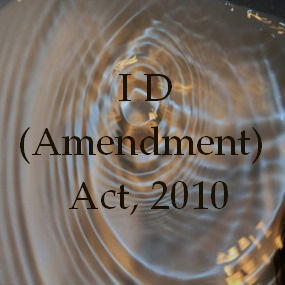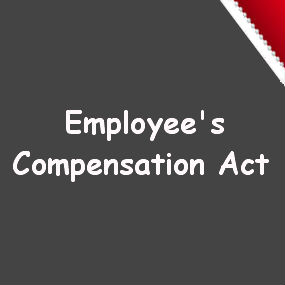61. Penalties :- (1) Any employer who makes any false or incorrect statement under Section 3 shall be punishable with fine which may extend to one hundred rupees.
(2) Any employer who contravenes any of the provisions of the Sections 3, 4, 5, 7, 9 to 12, 13, 15 to 32; 34 to 47; 49, 68 and 69 shall be punishable for a first offence with fine which may extend to rupees one hundred, for a second offence with fine which shall not be less than rupees two hundred and fifty but which may extend to rupees five hundred and for the third or subsequent offences with imprisonment for a term which may extend to three months and with a fine which shall not be less than rupees five hundred but which may extend to rupees one thousand:
Provided that where any employer fails to possess a valid certificate of registration in contravention of the provisions of Sections 3, 4 and 5, he shall, on conviction be punishable, in the case of a continuing offence with a further fine which may extend to rupees two hundred and fifty for each day during which the offence continues.
(3) Whoever contravenes the provisions of Section 8 shall be punishable for a first offence with fine which may extend to one hundred rupees, and for second or subsequent offence with fine which may extend to two hundred and fifty rupees.
(4) Whoever contravenes the provisions of sub section (2) of Section 48 shall on conviction be punishable with fine which may extend to rupees fifty for each day during which the offence continues.
(5) Whoever contravenes the provisions of sub section (3) of Section 48 shall on conviction be punishable with a fine which may extend to rupees fifty for each day during which the offence continues.
(2) Any employer who contravenes any of the provisions of the Sections 3, 4, 5, 7, 9 to 12, 13, 15 to 32; 34 to 47; 49, 68 and 69 shall be punishable for a first offence with fine which may extend to rupees one hundred, for a second offence with fine which shall not be less than rupees two hundred and fifty but which may extend to rupees five hundred and for the third or subsequent offences with imprisonment for a term which may extend to three months and with a fine which shall not be less than rupees five hundred but which may extend to rupees one thousand:
Provided that where any employer fails to possess a valid certificate of registration in contravention of the provisions of Sections 3, 4 and 5, he shall, on conviction be punishable, in the case of a continuing offence with a further fine which may extend to rupees two hundred and fifty for each day during which the offence continues.
(3) Whoever contravenes the provisions of Section 8 shall be punishable for a first offence with fine which may extend to one hundred rupees, and for second or subsequent offence with fine which may extend to two hundred and fifty rupees.
(4) Whoever contravenes the provisions of sub section (2) of Section 48 shall on conviction be punishable with fine which may extend to rupees fifty for each day during which the offence continues.
(5) Whoever contravenes the provisions of sub section (3) of Section 48 shall on conviction be punishable with a fine which may extend to rupees fifty for each day during which the offence continues.
62. Power to compound offence :- The Chief Inspector may authorise by notification any officer to accept from any person who is reasonably believed to have committed an offence under Sections 3, 4, 7, 8, 10, 12, 15, 16, 17, 19, 20, 31 and 63 of this Act or the rules made thereunder a sum of money not exceeding rupees one hundred in case of each violation by way of compounding such offence. Any proceedings taken against such person in respect of such offence shall on payment of such money be withdrawn and no further proceedings shall be taken in respect of such offence.
63. Penalty for obstructing Inspector etc. :- Any person who wilfully obstructs an Inspector in the exercise of any power conferred on him by or under this Act or any person lawfully assisting such Inspector in the exercise of such power, or who fails to comply with any lawful direction made by such Inspector, shall be punishable with imprisonment for a term which may extend to three months or fine or with both.
64. Procedure in trial of offences :- (1) No Court shall take cognizance of a complaint against an employer under sub section (2) of Section 61 relating to deductions from the wages or delay in payment or wages or service compensation payable under this Act to an emplo yee, unless an application in respect of facts constituting the offence has been presented under Section 51 and has been granted wholly or in part and the authority empowered under the latter section or the appellate authority granting such applications has sanctioned the making of the complaint.
(2) Before sanctioning the making of a complaint against the employer for such an offence, the authority empowered under Section 50 or the Appellate Authority, as the case may be, shall give such employer an opportunity of showing cause against the granting of such sanction, and the sanction shall not be granted if such employer satisfies the authority or Court that his default was due to :
(a) a bonafide error or bonafide dispute as to the amount payable to the employee; or
(b) the existence of exceptional circumstances, such that the employer was unable, though exercising diligence, to make prompt payment; or
(c) the failure of the employee to accept payment.
(3) No Court shall take cognizance of a complaint against any person for an offence under Section 61 other than the offence referred to in sub section (1) or for a contravention of any rule made under Section 71 except on a complaint made by or with the previous sanction in writing of an Inspector under this Act within six months from the date on which the offence or contravention is alleged to have been committed.
(4) In imposing any fine for an offence referred to in sub section (1), the Court shall take into consideration the amount of any compensation already awarded against the accused in any proceedings taken under Section 51.
(2) Before sanctioning the making of a complaint against the employer for such an offence, the authority empowered under Section 50 or the Appellate Authority, as the case may be, shall give such employer an opportunity of showing cause against the granting of such sanction, and the sanction shall not be granted if such employer satisfies the authority or Court that his default was due to :
(a) a bonafide error or bonafide dispute as to the amount payable to the employee; or
(b) the existence of exceptional circumstances, such that the employer was unable, though exercising diligence, to make prompt payment; or
(c) the failure of the employee to accept payment.
(3) No Court shall take cognizance of a complaint against any person for an offence under Section 61 other than the offence referred to in sub section (1) or for a contravention of any rule made under Section 71 except on a complaint made by or with the previous sanction in writing of an Inspector under this Act within six months from the date on which the offence or contravention is alleged to have been committed.
(4) In imposing any fine for an offence referred to in sub section (1), the Court shall take into consideration the amount of any compensation already awarded against the accused in any proceedings taken under Section 51.
65. Bar of suits :- No Court shall entertain any suit for the recovery of wages or service compensation or of any deduction therefrom in so far as the sum so claimed
(a) forms the subject of an application under Section 51 which has been presented by the plaintiff and which is pending before the authority appointed under Section 50 or of an appeal under Section 53; or
(b) has formed the subject of a direction under Section 51 in favour of the plaintiff;or
(c) has been adjudged, in any proceeding under Section 51 not to be owed to the plaintiff;or
(d) could have been recovered by an application under Section 51.
(a) forms the subject of an application under Section 51 which has been presented by the plaintiff and which is pending before the authority appointed under Section 50 or of an appeal under Section 53; or
(b) has formed the subject of a direction under Section 51 in favour of the plaintiff;or
(c) has been adjudged, in any proceeding under Section 51 not to be owed to the plaintiff;or
(d) could have been recovered by an application under Section 51.
66. Contracting out :- Any contract or agreement, whether made before or after the commencement of this Act, whereby an employee relinquishes any right conferred by this Act shall be null and void in so far as it purports to deprive him of such right.
67. Offences to be tried by Magistrate of Second Class or above :- No Court, inferior to that of a Magistrate of Second Class shall try any offence punishable under this Act or any rule or order made thereunder.









